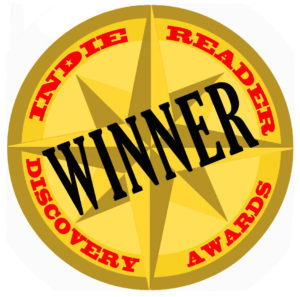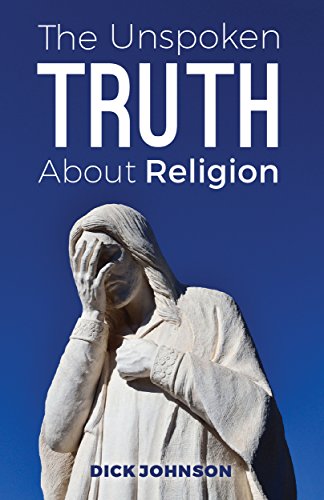
The Unspoken TRUTH About Religion was the winner in the Religion category of the 2019 IndieReader Discovery Awards, where undiscovered talent meets people with the power to make a difference.
Following find an interview with author Dick Johnson.
What is the name of the book and when was it published?
The Unspoken TRUTH About Religion, published March 15, 2018.
What’s the book’s first line?
The book’s first line is “If I had to sum up my life’s perspective in two words, they would probably be ‘Yeah, but…’ ”
What’s the book about? Give us the “pitch”.
Religion is held to be the source of our values and morality, the impetus behind all things good. Yet it sustains an unparalleled acquaintance with death, destruction, and terrorism. And generation after generation we fail to acknowledge, much less explore, this glaring incongruity. Historians have written endlessly on the many origins of religion, and critics have written countless volumes on the immeasurable atrocities committed in its name. But here we are in the 21st century, splicing genes and colliding particles at near the speed of light, and we still don’t have a coherent understanding of why we practice this most enigmatic of human behaviors. Our technical knowledge, that which reflects the rational side of human behavior, is doubling every couple of years, rapidly increasing the human ability to not just innovate, but to destroy and devastate. Yet our understanding of religion, the only irrational behavior we widely embrace and encourage, has remained virtually unchanged throughout history. The immense significance being, it is our irrational behaviors that have always been and will always be the greatest catalyst for human conflict. Only to the extent we understand our emotionally driven behaviors can we mitigate the rapidly growing dangers that naturally accompany our soaring awareness. This book provides the understanding that humanity needs to purge itself of religious conflicts and terrorism the world over.
What inspired you to write the book? A particular person? An event?
This book was precipitated by the events of September 11, 2001 and the indescribable anguish it left in its wake.
What’s the main reason someone should really read this book?
Whether we realize it or not, everyone needs to understand why we practice religion, what it does and does not do for us, and how even seemingly innocuous forms of it come to generate humanity’s most horrific conflicts. Only when the masses possess such awareness will the harmful fallacious rationales that fuel religious conflicts and terrorism dissolve and disappear from the human experience.
If they made your book into a movie, who would you like to see play the main character(s)?
If they made this book into a movie, it would be the most controversial and disruptive documentary ever, and therefore have no characters, only a narrator.
When did you first decide to become an author?
The decision to become an author wasn’t so much that of choice, but rather something that was necessitated by a feeling of responsibility. For whatever reason, I find that I am rather adept at connecting cause-and-effect relationships, especially the complex or far-removed. It’s an ability that enables me to recognize the root cause of many difficult problems. But it comes with a feeling of responsibility. While most struggle to understand how religion, something that is supposed to be the essence of good, can be found at the heart of so much death, destruction, and terrorism, I see it clearly, hence the overwhelming feeling of responsibility to write the book.
Is this the first book you’ve written?
The Unspoken TRUTH About Religion is indeed my first work.
What do you do for work when you’re not writing?
When I’m not writing, I spend my time searching for old shipwrecks and sunken treasure.
How much time do you generally spend on your writing?
I try to write for a couple of hours each day.
What’s the best and the hardest part of being an indie?
The most difficult part of being an indie is that, in order to end up with a great book, you must learn all the various disciplines that go into making a great book. The best part of being an indie is that there is nothing that compares to the immense satisfaction of completing that long arduous journey.
What’s a great piece of advice that you can share with fellow indie authors?
I think the most pragmatic piece of advice that can help any indie, regardless of what they’re writing, is to reread their work many, many times, even after they think they’ve got a ‘finished’ product. I don’t know of anyone who has done this and wasn’t thankful that they did. There is just something about letting your work simmer in your subconscious that brings clarity like nothing else can.
Would you go traditional if a publisher came calling? If so, why?
Though the freedom and control of being an indie is extremely attractive, I think I probably would go traditional if a publisher came calling, primarily because it would help considerably in disseminating the book’s extraordinarily important message.
Is there something in particular that motivates you?
I’m sure I’d embrace any fame or fortune that might come my way, but I think it’s probably something the 19th-century abolitionist Horace Mann once said that motivates me most these days. He said “Be ashamed to die until you have won some victory for humanity.”
Which writer, living or dead, do you most admire?
I think the writer I most admire would have to be Samuel Clemens, a.k.a. Mark Twain. There is just something about how he was able to cut through the facade of human pretenses, to reach our natural vulnerabilities.
Which book do you wish you could have written?
I know how egotistical, self-serving, and perhaps narrow-minded this must sound, but because it contains what is arguably the most important knowledge that has yet to crest the horizon of human awareness, the honest reality is I can think of no book that I would rather have written than the one I wrote, The Unspoken TRUTH About Religion.
